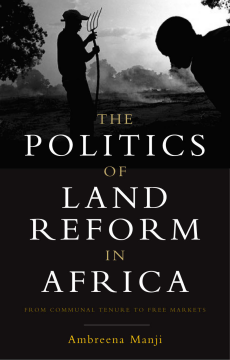
Additional Information
Book Details
Abstract
Across Africa land is being commodified: private ownership is replacing communal and customary tenure; Farms are turned into collateral for rural credit markets.
Law reform is at the heart of this revolution. The Politics of Land Reform in Africa casts a critical spotlight on this profound change in African land economy. The book illuminates the key role of legislators, legal consultants and academics in tenure reform. These players exert their influence by translating the economic and regulatory interests of the World Bank, civil society groups and commercial lenders in to questions of law. Drawing on political economy and actor-network theory The Politics of Land Reform in Africa is an indispensable contribution to the study of agrarian change in developing countries.
'An insightful analysis of the logic and agencies governing land reform in Africa in the age of neoliberal globalization...Manji must be commended for alerting us to the fact that proposed land reforms will undermine the livelihood of the African people, strengthen patriarchal relations, and intensify violence against women.'
Silvia Federici, African Studies Review
'As a hypothesis, this interesting and should be taken seriously.'
Quarterly Journal of International Agricultural
'A broad commentary'
'Insightful for anyone interested in this topic.'
Choice
Ambreena Manji is a Reader in the Department of Law, University of Keele. She is also a Fellow of the Institute of Commonwealth Studies, University of London. She has written extensively on land reform, gender and development, and the role of international financial institutions.
Table of Contents
| Section Title | Page | Action | Price |
|---|---|---|---|
| Cover | Cover | ||
| Contents | v | ||
| Acknowledgements | vii | ||
| Introduction | 1 | ||
| The politics of land reform in Africa | 1 | ||
| Altering land relations | 2 | ||
| The revival of ‘law and development’ | 9 | ||
| Structure and agency in ‘law and development’ | 12 | ||
| Collateral damage | 19 | ||
| Conclusion | 21 | ||
| Notes | 25 | ||
| Contemporary land reform in Africa | 31 | ||
| Defining land reform | 31 | ||
| African land questions | 39 | ||
| Chronologies of land reform | 43 | ||
| Conclusion | 46 | ||
| Notes | 47 | ||
| Paying for law: the World Bank and bilateral donors | 51 | ||
| Promoting the rule of law | 52 | ||
| The role of the World Bank in the privatization of land | 54 | ||
| The role of bilateral donors | 62 | ||
| Linking the global and the local | 65 | ||
| The global land reform network | 69 | ||
| Conclusion | 73 | ||
| Notes | 73 | ||
| Making law: inside the ‘law laboratory’ | 78 | ||
| The role of lawyers | 79 | ||
| ‘The law laboratory’ in the network of land reform | 82 | ||
| The politics of legal methodology | 89 | ||
| Conclusion | 95 | ||
| Notes | 96 | ||
| Contesting law? ‘Gender progressive’ groups and rural movements | 99 | ||
| Case studies: gender progressive groups in East Africa | 100 | ||
| Ideologies and tactics of rural movements | 114 | ||
| Conclusion | 117 | ||
| Notes | 118 | ||
| The future of land relations | 122 | ||
| Problems of implementation | 123 | ||
| Worsening gender relations | 124 | ||
| The role of commercial lenders and the judiciary | 129 | ||
| Notes | 132 | ||
| Conclusion | 137 | ||
| Notes | 142 | ||
| Index | 144 |
